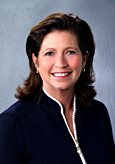Gloria Nelund: Mobilizing Middle-Class Investors to Build the Middle Class Abroad
August 19, 2011
As one of the most successful and visible executives of an international financial institution, and now the leader of an impact investment firm managing over $85 million dollars worldwide, Gloria Nelund had a very a-typical entrance into the banking world. As an undergrad, Gloria studied elementary education at the University of Dayton. Then a friend helped her to get a job at a local bank. She liked the job so much that she soon dropped out of college. Her work ethic and easily recognizable talents soon led to promotion after promotion within the financial industry.
Eventually, while employed as a manager at Security Pacific Bank, her bosses decided to send Gloria to the Darden School of Business at the University of Virginia to complete her formal education. Some years later she became the CEO of the U.S. Private Wealth Management Division of Deutsche Bank, the world’s fifth largest financial institution. There she was responsible for more than $50 billion in investment assets.
A committed Christian her whole life, Gloria struggled to understand how her talent for banking fit with her passion to serve Christ. Even as the Lord opened doors and allowed Gloria to gain vocational power and influence within her field, Gloria admits, “I always had a lot of guilt about not being a pastor, a missionary, or something that was–in my mind–‘serving the Lord.’”
Although she says, sadly, that she received no good training from her church on vocational stewardship, Gloria grew to identify a few areas where she could “bloom” as a banker. She says it was practical, rational mind that helped her to see how her job was advancing God’s Kingdom values of justice and economic sufficiency. The key, she says, is to “treat people fairly [and] balance all the needs of your stakeholders.” In her experience, she’s seen that the companies that practice the values of transparency and honesty, doing “all those things that we know as good Judeo-Christian values” financially outperform companies that don’t.
At Deutsche Bank, Gloria used her influence to encourage the Bank in socially responsible investing. She also helped get a micro-lending project established. The latter was a strategy she had learned about through the Grameen Bank, and it resonated with her. She says in her philosophy about the best way to help the underprivileged, the emphasis shouldn’t be handouts. “It’s better to let people earn their way.”
Eventually the relentless schedule of high-flying international finance began to take a toll on Gloria. She recalls a moment that should have been a highpoint of her career. After untold hours, she’d successfully turned around the ailing Deutsche Bank and earned it a $25 million profit in one first quarter of 2005. Instead, she went back to her New York apartment depressed. “I literally just got on my knees and was like, ‘You know Lord, there’s got to be more to life than this.’ It was just one of those things where, I had just had what should be this extreme pinnacle of my career, and I just feel lonely and let down. I was sitting there in my apartment thinking, “Gosh, I have no friends, I never see my family, my life is really out of balance, and I need to do something.”
She came to a major decision: she’d take a long sabbatical to recharge and focus on her family and faith. Out of that season of reflection, the 25-year Wall Street veteran decided to launch out on a new path: that of a social entrepreneur.
In 2007, Gloria co-founded with a former colleague TriLinc Global, an impact investment firm “dedicated to harnessing the collective power of individual investors in order to help businesses in developing countries create jobs, grow the middle class, and generate measurable, positive impact.”
Gloria says that she understood early on that capitalism and good business are both ways “to really change the world,” but realized there was a lack of products available for middle-class Americans to get involved in gane-changing initiatives. Seeing that gap, Gloria felt a call from God to be a forerunner in this field.
TriLinc’s model is all about providing “Main Street” middle-class investors opportunities to do what traditionally only the very wealthy have been able to do: social impact investing. This is a form of investment where the investors are looking for a double bottom line: a decent financial return and a meaningful social return. In Trilinc Global’s case, middleclass Americans will have opportunities to invest in small business lending institutions in the developing world. This is a step above microfinance, which typically serves one individual or family. These loans will target small- and medium-sized businesses that can provide jobs for a number of employees. Gloria emphasizes that such loans will benefit that group of businesspersons abroad who can eventually form a healthy, stable, middle class. “The real economic engine [in poor countries] is the growth of the middle class,” she explains. “And yet, they’re not getting capital, they’re being starved for capital.” Trilinc Global targets this “missing middle” and helps them grow their businesses.
In theory, Gloria could have started a nonprofit agency that would solicit charitable gifts from Americans to give away in poor countries. But that approach fit neither her own sense of how best to address poverty nor the glaring capital opportunity presented by the dollars in the average Christian’s investment portfolio. Christians are doing some good with their charitable dollars—but those gifts often pale in comparison to the amount of money Christians put into their investments. Christians should think more wisely and creatively about how to do some good with those investment dollars, not just their charitable funds. TriLinc Global now makes that possible since its minimum investment will be $5000 (versus a typical $250,000 minimum for most impact investing funds).
Throughout her vocational journey, Gloria has seen how the Lord has used her talents and various roles in the financial services industry to lead her to the innovative work she is doing today. “[T]he Lord opened the door and put me in at just this moment, to take advantage of what is going on in the industry around impact investing,” she says. “Because of my knowledge and background…our first fund that we’re launching is already $1.2 billion dollars.”
“And I think ‘Wow, you can help a lot of people with 1.2 billion dollars.’”
By Amy L. Sherman and Kelly Givens, 2011
www.vocationalstewardship.org


